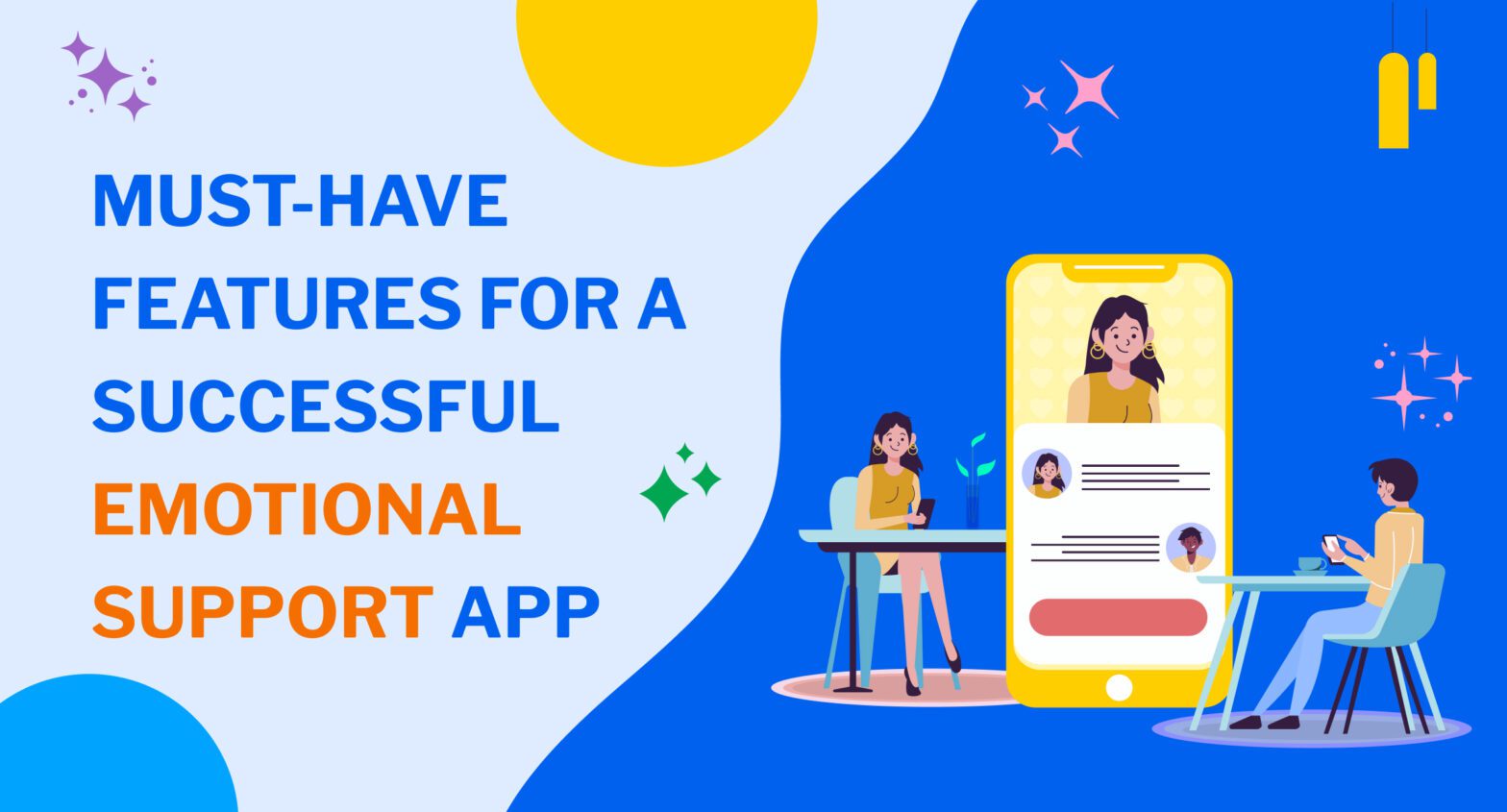Investing in an emotional support or mental wellness app may sound wild, but it is actually worthwhile. Emotional support app ideas are on the rise among entrepreneurs and startups in 2025. There are growing cases of mental health issues and highly stressful lifestyles. At the same time, there is a lack of empathetic, secure, and smart emotional support platforms. This imbalance has created a need for an impactful platform that is not only empathetic in design but also in the right technology stack and feature set.
Think of an emotional support app as a meditation or habit-tracking app. They require similar or even more customized services and care. At Nyusoft, we focus on something deeper than the surface-level functionality. We integrate AI to offer completely personalized care to users. Moreover, our experts prioritize secure peer-to-peer networks and scalable infrastructure to truly serve the users.
Here are the must-have features every emotional support app should include:
1. User-Friendly Onboarding & Personal Profiles
First impression is the last impression, especially for apps and websites. For an emotional support app, where trust is essential, an intuitive and flawless experience makes a solid first impression. Hence, to boost meaningful interactions and user retention, these features will truly make a difference:
Social logins & single sign-on (SSO): Makes account creation and registration seamless and quick.
Personalized User Profiles: Every user is unique, and their profile should reflect this. Elements like language preferences, user demographics, and support needs will help make personalized profiles.
Adaptive questionnaires: Dynamic AI forms help to better understand users’ emotional state and goals.
This data, collected at an early stage, will later help AI algorithms to offer customized recommendations to users and make the whole experience personalized to the next level.
2. AI-Powered Real-Time Chat & Voice Support
Waiting for hours and not getting the right information at the right time can impose a negative impact on the app. AI enhances the features of an emotional wellness app by providing instant and precise responses. Let’s understand the important factors of this feature:
Natural Language Processing (NLP): AI interprets tone, voice, intent, and context of a user’s chats.
Emotion recognition algorithms: The AI algorithms can identify the signs of distress from the user's chat or calls.
Voice Support: Real-time audio creates a one-on-one, empathetic interaction.
Multilingual capabilities: The platform can serve users around the world without language barriers, making support accessible globally.
Chat is one of the essential parts of such platforms. Users expect no glitches in this frequently used feature; hence, it should be able to handle a high load of users.
Also Read: How AI is Driving the Growth of Mental Wellness Platforms And How You Can Build One
3. Seamless Video/Audio Integration with Peer Connections
While AI gives excellent and instant support, many users still prefer human interaction. A successful emotional support app should enable users to connect with either professionals or other peers who are willing to offer help. Because when there is a human-to-human connection, it is easier to share experiences, listen, and offer support.
Built-in video/audio modules: This one’s a keeper. Because it gives very secure and minimally delayed communication powered by APIs like Jitsi.
Scheduling & notifications: Very important for users to book calls at convenient times.
HIPAA-compliant encryption: Ensures all sessions are private and secure.
A perfect blend of AI features and human interactions will create a balanced and community-driven emotional support platform. Users will definitely feel valued, seen, heard, and relieved when using the app. All of it will eventually lead to user retention, too.
4. Mood Tracking & Journaling Tools
Consultations might be the main element of emotional wellness. However, self-reflection and staying grounded and mindful are also important. Add a few tools that develop a good habit in the user, like mood logs and digital journaling.
Daily mood logs: Users can note down feelings via text or pre-defined emotion options.
AI-driven journaling prompts: Give the users a physical journal-like experience with reflective questions or exercises. It will encourage consistency.
Visualization dashboards: Graphs and heatmaps highlight patterns over time.
Wearables integration: This sounds like a lot, but wearables can give a full picture of a user’s mental health. You can sync with devices to monitor heart rate, sleep patterns.
5. Community & Support
An emotional support platform is all about exchanging meaningful interactions and sharing experiences with other humans. Community and peer support can change the game here:
Moderated forums: AI-powered moderation ensures safe, positive discussions.
Anonymous participation: Users can share experiences without fear of judgment.
Group sessions: Voice rooms and virtual meetups allow shared emotional experiences.
These features help users establish a better connection with the platform. They help in creating a sense of belonging, empathy, and relatability among users as compared to the conventional therapy approaches.
6. Resource Library (Self-Help & Learning Hub)
Those who are not looking for consultation can leverage this feature. It is like helping a broad audience without asking for more in return. It could have:
Dynamic Content Library: Users can find guides, resources, articles, etc, here.
AI Recommendation System: AI will suggest content based on the user's data, interactions, and mood logs.
Offline access: Enables users to access resources even without internet connectivity.
A Content Delivery Network (CDN) gives fast, seamless access for users across regions.
7. Crisis Management & SOS Features
This is for high-risk scenarios where the platform should be able to provide prompt assistance. It is feasible with:
SOS button: Users can contact local helplines or emergency contacts by simply tapping the SOS button.
Geo-location APIs: This cutting-edge function assists users in locating the closest resources for assistance.
AI escalation: When high-risk interactions are identified, trained moderators or support peers take action.
It functions as a backup recovery system that will always be up and running.
8. Analytics & Feedback Loop
Insights are essential for future improvements and scalability. On the other hand, data-driven insights can help in providing personalized help to users:
In-app surveys & ratings: Collect user feedback seamlessly.
Predictive analytics: Machine learning models analyze mood, interaction, and journaling patterns to predict potential distress.
Admin dashboards: Provide KPIs like engagement rates, retention, and session success metrics.
Admins can optimize AI algorithms and features with the help of these insights. It can truly enhance user experience.
Conclusion
Having a combination of some of the best features in an emotional wellness app is excellent. However, the success depends not only on the features, but also on a carefully designed ecosystem. It is made with peer-to-peer networks, secure and real-time communication, and prompt, meaningful support. The end goal is the users to give users a community they can engage with. The platform should track their emotional progress and provide resources that help them grow.
At Nyusoft, we focus on making AI-powered, real-time emotional support apps that include these important features. We focus on creating truly transformative apps by combining scalable infrastructure, strong security, and thoughtful design.



